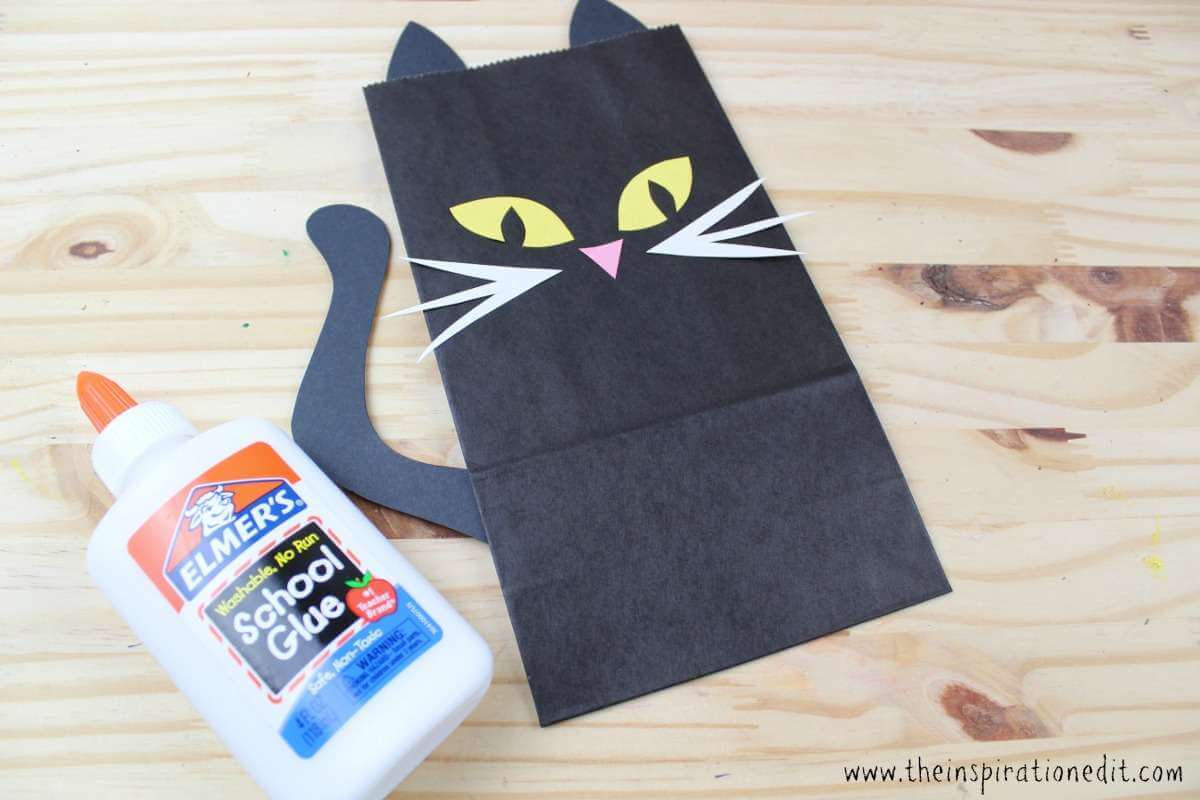Homemade gift bags are easy to make, and they’re great options for kids and beginning crafters, as well as experienced DIYers looking for quick ways to add personal touches to gift and treat bags. If you’re looking for cat-themed options, you’re in luck, as there are several to choose from, including simple projects that don’t require much in the way of materials and more advanced ones that are perfect for showing off your crafting skills.
From bags perfect for holding party favors and treats to choices you can use instead of traditional wrapping paper, there are several cat-themed options to consider. Below, you’ll find seven fun DIY cat gift bag ideas you can use for inspiration.
Top 7 DIY Cat Gift Bag Ideas
1. Easy Paper Gift Bag by Cellustrationart
| Materials: | A4 paper, glue, pens |
| Tools: | None |
| Difficulty Level: | Easy |
You can make these incredibly simple and adorable bags in minutes using nothing more than a regular piece of paper, glue, and some ingenuity. The project involves folding a piece of paper several times to create a bag that’s just the right size for holding party favors.
After you put the envelope together, use the pens to draw fun cat faces on the finished products. It’s a great creative project for kids since it doesn’t require scissors or glue guns.
2. Simple Halloween Gift Bag by The Inspiration Edit

| Materials: | Paper bags, card stock, glue, template, pencil |
| Tools: | Scissors |
| Difficulty Level: | Easy |
These Halloween-themed bags are easy to make but look so good that everyone you know will think you spent hours constructing them. You can download the free template, trace it onto cardstock, cut out the shape, and then use glue to secure it all to the paper bag. While the instructions call for a black paper bag and three specific colors of cardstock, you can get creative and use other colors.
3. Paper Hello Kitty Gift Bags by The Crafting Chicks

| Materials: | White bags, white, pink, yellow, and black craft foam, glue |
| Tools: | Scissors |
| Difficulty Level: | Easy |
Using white gift bags that you can buy at pretty much any craft store (and may already have lying around the house) makes this a super easy project you can complete in no time.
You’ll cut out ears, a nose, whiskers, and a bow from craft foam, paste them on the bag, and you’re done. You can add a few sheets of pink tissue paper for a polished look. There’s no template to follow, but the blog post includes pictures that make the entire process clear.
4. Foam Hello Kitty Gift Bags by D.I.Yay!
| Materials: | Foam sheet, felt, acrylic paint, pencil |
| Tools: | Embossing tool, scissors, glue gun, paintbrush |
| Difficulty Level: | Easy Plus |
These foam Hello Kitty gift bags take things to the next level; they look like cute little purses you can pack with gifts and party favors. Although the project isn’t that technically demanding, unless you’re a dedicated crafter, you’ll likely need to head to the store before getting started to ensure you have all the materials on hand. However, it’s well worth the trip since the bags look spectacular when completed.
5. Customizable and Easy Gift Bags by In The Bag Kids’ Crafts

| Materials: | Paper bag, paint, marker, eyes, construction paper, glue |
| Tools: | Scissors |
| Difficulty Level: | Easy |
These super simple bags can be made with materials you probably already have at home if you’re into crafting. You’ll start by trimming the top part of a paper bag to create a cat ear outline and add fur using the paint. Use scissors to cut whiskers from construction paper and paste them on (along with the eyes) with a dab of glue.
You can use whatever paint you have on hand or colored markers if you prefer. Once you get the hang of the idea, it’s easy to make animal-themed gift bags with the same basic materials and tools.
6. Small Clear Cat Gift Bags by D.I.Yay!
| Materials: | Ziplock bag, silicon glue, thread, marker, glitter foam sheet |
| Tools: | Scissors |
| Difficulty Level: | Easy Plus |
These adorable see-through Hello Kitty bags are perfect if you’re looking for a way to make clear bags to show off cool gifts and party favors; the bags even have adorable handles. Grab a Ziplock bag, trim a few pieces of glitter foam, glue them into place, and you’re done.
The bags look fantastic and are perfect if you’re looking for a crafting option that provides creative freedom. Use whatever color glitter foam strikes your fancy, and the cat design in the middle of the bag is up to you to dream up.
7. Super Simple Hello Kitty Gift Bags by Craftastic
| Materials: | A4 paper, yellow, pink, and black construction paper, glue, marker |
| Tools: | Scissors |
| Difficulty Level: | Easy |
These Hello Kitty gift bags are simple to put together and are guaranteed to bring a smile to the face of any cat-lover. They feature cute little handles that add a fun touch. The project is built around a bag you make by folding a sheet of A4 paper (glue is also involved).
The bag handles and cat features are made from cut-out pieces of construction paper and are simply glued onto the bag. While you can use paper in the suggested colors to create Hello Kitty-themed options, it’s also possible to do your own thing and show off your creativity.
Conclusion
Homemade cat gift bags are great ways to get creative (and let people know how much you care!). They generally don’t require much crafting expertise to complete, but there are options more experienced DIYers can enjoy digging into as well. While some of the more involved projects may require a trip to the craft store, many can be made with materials you already have on hand.
Featured Image Credit: 5 second Studio, Shutterstock
Contents
- Top 7 DIY Cat Gift Bag Ideas
- 1. Easy Paper Gift Bag by Cellustrationart
- 2. Simple Halloween Gift Bag by The Inspiration Edit
- 3. Paper Hello Kitty Gift Bags by The Crafting Chicks
- 4. Foam Hello Kitty Gift Bags by D.I.Yay!
- 5. Customizable and Easy Gift Bags by In The Bag Kids’ Crafts
- 6. Small Clear Cat Gift Bags by D.I.Yay!
- 7. Super Simple Hello Kitty Gift Bags by Craftastic
- Conclusion











